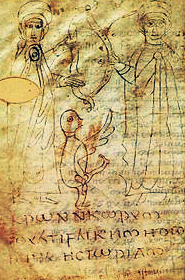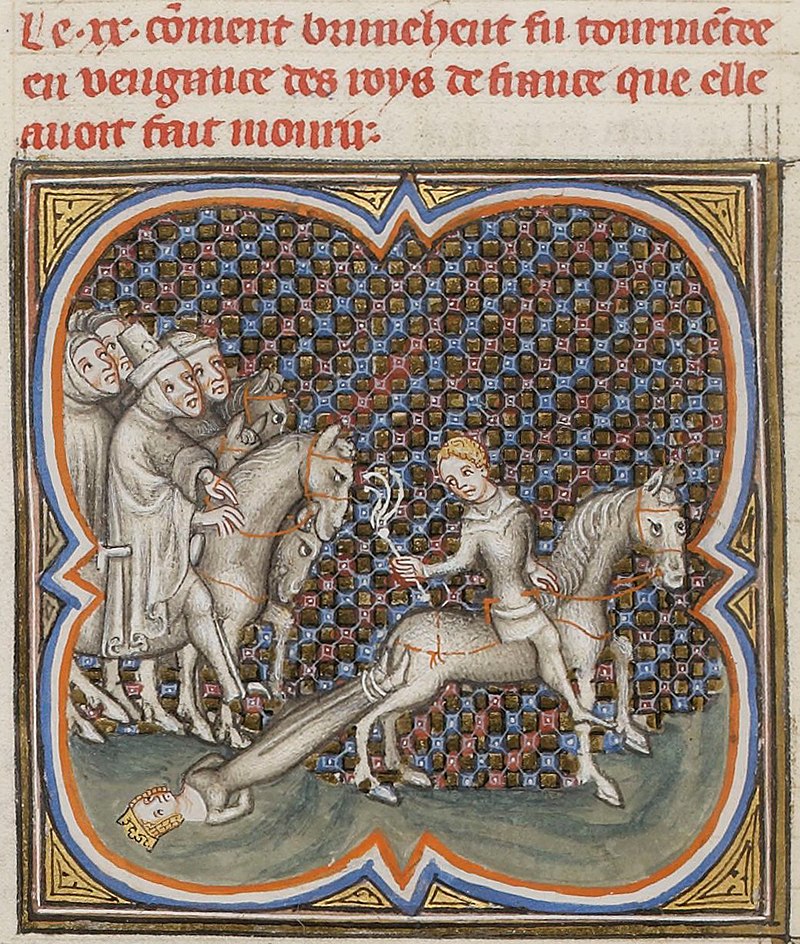The fall of Brunhilda and the first peak in the Christianisation of the idea of kingship
 (Left, pen drawing from the earliest manuscript of the Chronicle of Fredegar which is believed to depict Eusebius and Jerome, 715 AD.) On the death of Childebert II, he was succeeded by his two sons: Theudebert II (595-612) in Austria, and Theuderic II (595-613) in Burgundy. Brunhilda was the first to rule in the name of her grandchildren, who were still minors, and who only gradually began to intervene in the struggles with the royal house of Neustria after they had reached majority.
(Left, pen drawing from the earliest manuscript of the Chronicle of Fredegar which is believed to depict Eusebius and Jerome, 715 AD.) On the death of Childebert II, he was succeeded by his two sons: Theudebert II (595-612) in Austria, and Theuderic II (595-613) in Burgundy. Brunhilda was the first to rule in the name of her grandchildren, who were still minors, and who only gradually began to intervene in the struggles with the royal house of Neustria after they had reached majority.
In Burgundy, of which she soon became the true ruler, she continued the struggle against Chlothar and, to take revenge on her Austrian enemies, instigated Theuderic against his brother Theudebert of Austria, who, she kept repeating, was not the son of a king but of a market gardener. As late as 600, the two brothers had jointly inflicted a heavy defeat on Chlothar II, who was then only sixteen years old, and had sacked his kingdom, reducing it to a narrow coastal strip around Rouen, Beauvais and Amiens. And still in 602 they had jointly fought the Basques and ‘with God’s help’ had subjected them to tribute.
But afterwards they fought each other fiercely and bloodily. The Chronicle of Fredegar recounts that
never since time immemorial had the Franks or any other people fought so fiercely. Such was the deadliness between the two armies that, where both sides began the battle, the corpses of the dead had no place to lie, but the dead were so crowded together among the other bodies that they stood upright as if they were alive. But Theuderic, with the help of God, defeated Theudebert once more; and the vassals of Theudebert during their flight from Zülpich to Cologne were put to the sword, covering the ground in stretches. On the same day Theuderic came to Cologne and seized all the treasures of Theudebert.
In Cologne, where the Franco-Burgundians entered, Theuderic had his brother tonsured and then cut off his head and annihilated his entire family. ‘Even a very young son of his was grabbed by the foot by order of Theuderic and beaten against a rock, until his brains fell out of his head’, says the Chronicle of Fredegar.
It was the end of one of the innumerable purely Catholic fratricidal wars.
The victor then attempted to seize control of the whole of Gaul and immediately advanced on Neustria. But when he was at the height of his triumph he died unexpectedly, still in his youth, in the year 613. His sons were also killed by Chlothar II of Neustria. But not his godson Merovech, whom Chlothar imprisoned in a monastery, but ‘whom he continued to love with the same affection with which he had taken him from the sacred font of baptism’ (Chronicle of Fredegar).
On the death of Theuderic in Metz, Brunhilda immediately had his eldest son and great-grandson, Sigibert II, who was about ten years old, proclaimed king of Austrasia and Burgundy. But the Austrasian grandees betrayed her. Led by the glorious ancestors of the Carolingians, the two traitors, the steward Pepin of Landen and Arnulf—the future saint and bishop of Metz—, went over to the side of Chlothar II. And after the high treason of the Austrian aristocracy, the queen was also abandoned by the feudal lords of Burgundy under the steward Warnachar. They had decided it beforehand ‘and of course both the bishops and the rest of the great lay lords, according to the contemporary chronicler… resolved not to let a single son of Theuderic escape, but to kill them all and then annihilate Brunhilda and to promote the sovereignty of Chlothar’.
This sealed the queen’s ruin, the exclusion and even the elimination of the Austro-Burgundian branch of the Merovingian dynasty, as well as the triumph of the nobility over the crown.
Brunhilda’s army deserted without resistance. She fled to the Jura and tried to sneak into Burgundy, but at Orbe (in today French Switzerland), by Lake Neuchatel, she was taken prisoner by the Frankish steward and handed over to her nephew.
Chlothar, as God-fearing as he was cruel and thoroughly ecclesiastical-minded, and who as the first Frankish king compared to David, whose ‘piety’ the Chronicle of Fredegar exalts, was a ruler who granted the clergy new rights and abundant donations, guaranteed them freedom of episcopal elections, exempted them from all the burdens of ecclesiastical property, was ‘clement and full of kindness to all’. The queen consort of Chilperic I, Fredegund, subjected her to torture for three days in the year 613. (Note of the Ed.: queen Brunhilda of Austrasia was Fredegund’s sister-in-law.) This happened when Brunhilda was already almost septuagenarian; she then had the soldiers ride her on a camel, and finally tied by her hair, one arm and one foot ‘to the tail of the wildest steed’ and dragged her to death, until ‘her limbs were torn off one after the other’ (Chronicle of Fredegar). Her bones were burned. And her offspring were also eliminated up to her great-grandchildren, with the sole exception of Prince Merovech, Chlothar’s godson.
 (Left, Brunhilde is dragged to her death.) But a modern researcher writes: ‘It was precisely under this ruler that, as can be clearly demonstrated, the Christianisation of the idea of the king reached its first peak’ (Anton).
(Left, Brunhilde is dragged to her death.) But a modern researcher writes: ‘It was precisely under this ruler that, as can be clearly demonstrated, the Christianisation of the idea of the king reached its first peak’ (Anton).
Pope Gregory had miscalculated. It was neither Brunhilda nor the Austrian branch that emerged victorious from these massive atrocities: the victor was the Neustrian Chlothar II, to whom Gregory had sent only a single letter of his 854 letters that have been preserved. In 614 the king convened a national synod in Paris which marked the beginning of the national Frankish Church, independent of Rome for a century.
3 replies on “Christianity’s Criminal History, 144”
The “artwork” of the Chronicle of Fredegar is so bad that it makes the worst of Pompeii’s murals look magnificent by comparison.
Do you have any advice at how to effectively spread the criminal story of Christianity without ending up like Nietzsche?
I think I may have an idea, but I would like to know your opinion first.
You can read this or this.